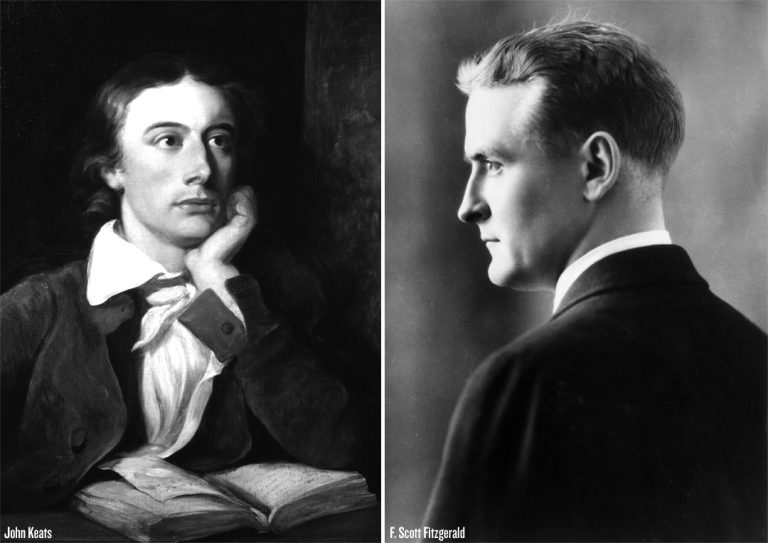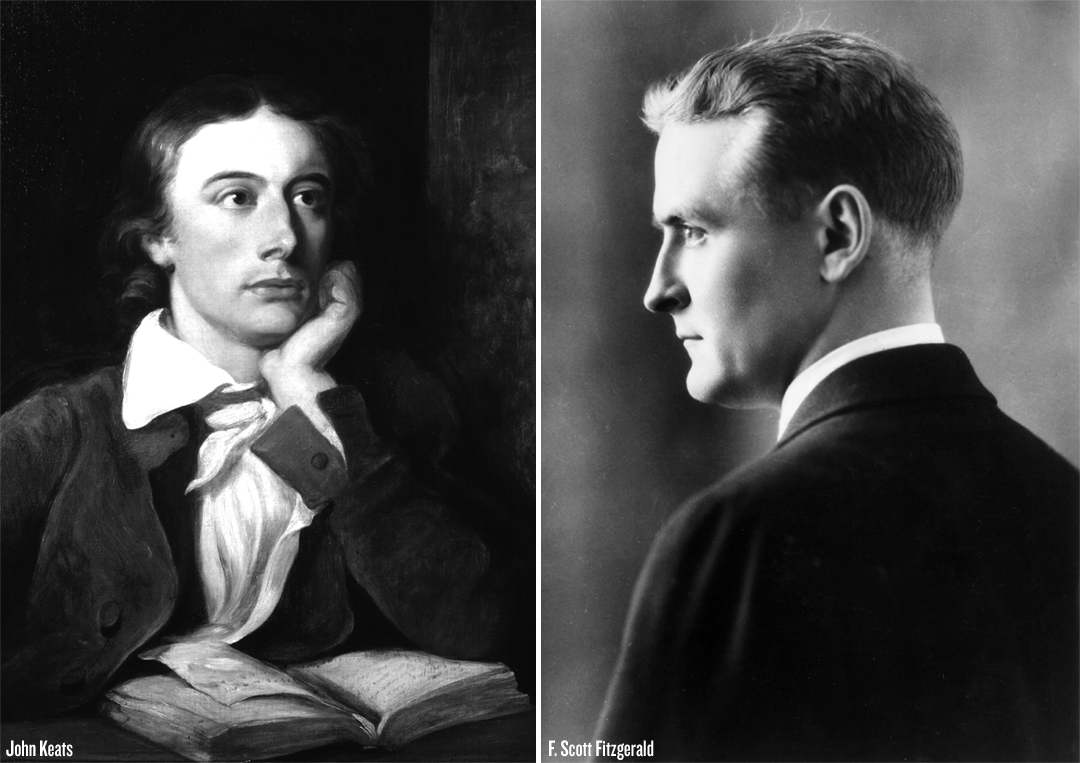F. Scott Fitzgerald (1896-1940) was the iconic American author of novels and short stories, whose works are the paradigmatic writings of the Jazz Age, a term he coined himself. He is widely regarded as one of the greatest American writers of the 20th century. Fitzgerald is considered a member of the “Lost Generation” of the 1920s, and he finished four novels throughout his legendary career: This Side of Paradise, The Beautiful and Damned, The Great Gatsby (his most famous), and Tender Is the Night. A fifth, unfinished novel, The Love of the Last Tycoon, was published posthumously. Fitzgerald also wrote many short stories that treat themes of youth and promise along with age and despair.
Fitzgerald’s work has been adapted into films numerous times. Tender is the Night was filmed in 1962, and made into a television miniseries in 1985. The Beautiful and Damned was filmed in 1922 and 2010. The Great Gatsby has been the basis for numerous films of the same name, spanning nearly 90 years; 1926, 1949, 1974, 2000, as well as its 2013 adaptation. In addition, Fitzgerald’s own life from 1937 to 1940 was dramatized in 1958 in Beloved Infidel. Fitzgerald has been a powerful and immortal inspiration to writers and readers worldwide, and in the following rare recording we get to hear Fitzgerald himself read one of his favorite poems of all time — John Keats‘s 1819 classic “Ode To A Nightingale”. Fitzgerald’s reciting of Keats’s “Ode To A Nightingale” was recorded in California in 1940.
My heart aches, and a drowsy numbness pains
My sense, as though of hemlock I had drunk,
Or emptied some dull opiate to the drains
One minute past, and Lethe-wards had sunk:
‘Tis not through envy of thy happy lot,
But being too happy in thine happiness,—
That thou, light-winged Dryad of the trees
In some melodious plot
Of beechen green, and shadows numberless,
Singest of summer in full-throated ease.
O, for a draught of vintage! that hath been
Cool’d a long age in the deep-delved earth,
Tasting of Flora and the country green,
Dance, and Provençal song, and sunburnt mirth!
O for a beaker full of the warm South,
Full of the true, the blushful Hippocrene,
With beaded bubbles winking at the brim,
And purple-stained mouth;
That I might drink, and leave the world unseen,
And with thee fade away into the forest dim:
Fade far away, dissolve, and quite forget
What thou among the leaves hast never known,
The weariness, the fever, and the fret
Here, where men sit and hear each other groan;
Where palsy shakes a few, sad, last gray hairs,
Where youth grows pale, and spectre-thin, and dies;
Where but to think is to be full of sorrow
And leaden-eyed despairs,
Where Beauty cannot keep her lustrous eyes,
Or new Love pine at them beyond to-morrow.
Away! away! for I will fly to thee,
Not charioted by Bacchus and his pards,
But on the viewless wings of Poesy,
Though the dull brain perplexes and retards:
Already with thee! tender is the night,
And haply the Queen-Moon is on her throne,
Cluster’d around by all her starry Fays;
But here there is no light,
Save what from heaven is with the breezes blown
Through verdurous glooms and winding mossy ways.
I cannot see what flowers are at my feet,
Nor what soft incense hangs upon the boughs,
But, in embalmed darkness, guess each sweet
Wherewith the seasonable month endows
The grass, the thicket, and the fruit-tree wild;
White hawthorn, and the pastoral eglantine;
Fast fading violets cover’d up in leaves;
And mid-May’s eldest child,
The coming musk-rose, full of dewy wine,
The murmurous haunt of flies on summer eves.
Darkling I listen; and, for many a time
I have been half in love with easeful Death,
Call’d him soft names in many a mused rhyme,
To take into the air my quiet breath;
Now more than ever seems it rich to die,
To cease upon the midnight with no pain,
While thou art pouring forth thy soul abroad
In such an ecstasy!
Still wouldst thou sing, and I have ears in vain—
To thy high requiem become a sod.
Thou wast not born for death, immortal Bird!
No hungry generations tread thee down;
The voice I hear this passing night was heard
In ancient days by emperor and clown:
Perhaps the self-same song that found a path
Through the sad heart of Ruth, when, sick for home,
She stood in tears amid the alien corn;
The same that oft-times hath
Charm’d magic casements, opening on the foam
Of perilous seas, in faery lands forlorn.
Forlorn! the very word is like a bell
To toll me back from thee to my sole self!
Adieu! the fancy cannot cheat so well
As she is fam’d to do, deceiving elf.
Adieu! adieu! thy plaintive anthem fades
Past the near meadows, over the still stream,
Up the hill-side; and now ’tis buried deep
In the next valley-glades:
Was it a vision, or a waking dream?
Fled is that music: — Do I wake or sleep?
For more inspiration from the world of literature, be sure to check out this FEELguide story from this past July: The WOW Files: The World’s Top 125 Writers Rank The 10 Greatest Books & Authors Of All Time. And to read more about the backstory behind the Long Island home that was the inspiration for F. Scott Fitzgerald’s Daisy Buchanan residence in The Great Gatsby you can read the following story as well: Bulldozers Demolish Long Island Mansion That Was Inspiration For F. Scott Fitzgerald’s Daisy Buchanan Residence In “The Great Gatsby”. And I never miss an opportunity to mention FEELguide favorite Lana Del Rey, so feel free to cleanse your palate of Fitzgerald’s reading with Lana Del Rey’s “Young And Beautiful” from director Baz Luhrmann’s 2013 adaptation of Fitzgerald’s The Great Gatsby.
SEE ALSO: Rare 1909 Recording Of Tolstoy Reading “A Calendar Of Wisdom”
SEE ALSO: Listen To The Only Known Recording Of Virginia Woolf’s Voice From 1937 Radio
SEE ALSO: FEELguide Classic: I Am Obsessed With Anthony Madler’s Mindblowing Video For Lana Del Rey’s “Ride”



